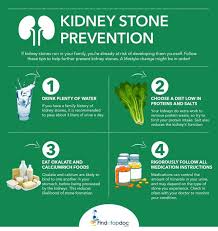
Prevention Tips for Renal and Gall Bladder Stone

Prevention Tips for Renal (Kidney) Stone
You may reduce your risk of kidney stones if you:
• Drink water throughout the day.
For people with a history of kidney stones, doctors usually recommend passing about 2.6 quarts (2.5 liters) of urine a day. Your doctor may ask that you measure your urine output to make sure that you are drinking enough water.
• Eat fewer oxalate-rich foods.
If you tend to form calcium oxalate stones, your doctor may recommend restricting foods rich in oxalates. These include rhubarb, beets, okra, spinach, Swiss chard, sweet potatoes, nuts, tea, chocolate and soy products.
• Choose a diet low in salt and animal protein.
Reduce the amount of salt you eat and choose no animal protein sources, such as legumes. Consider using a salt substitute.
• Continue eating calcium-rich foods, but use caution with calcium supplements.
Calcium in food does not have an effect on your risk of kidney stones. Continue eating calcium-rich foods unless your doctor advises otherwise. Ask your doctor before taking calcium supplements, as these have been linked to increased risk of kidney stones. You may reduce the risk by taking supplements with meals. Diets low in calcium can increase kidney stone formation in some people.
Prevention Tips for Gall Bladder Stone
You may reduce your risk of Gall Bladder stones if you:
Include unsaturated fats in your diet.
Although saturated fats contribute to the formation of gallstones, poly- and monounsaturated fats help prevent them. These are usually known as good fats. Good fats help keep the gallbladder empty, which reduces the formation of gallstones in bile. Include foods high in good fats in your diet to help prevent gallstones.
Drink plenty of water.
Water is an essential nutrient that hydrates your body and helps flush out toxins in your system. There are various recommendations for daily fluid intake, but the 8 eight-ounce glasses rule remains popular. Your fluid intake should be enough to keep your urine light yellow or clear.
Exercise regularly.
Exercise, especially endurance-based exercises, can reduce your risk of forming gallstones by helping you maintain a healthy weight, reducing one of the risk factors for gallstones.
Eat regularly.
Skipping meals results in sporadic bile production, which can increase your chances of forming a gallstone. It is healthier to eat at regular intervals and avoid skipping meals. Stick to your usual meal schedule as closely as possible to reduce your risk of gallstones.
Avoid crash-dieting.
Although maintaining a healthy weight is important for reducing your risk of gallstones, do not lose weight too quickly. Crash diets, which are characterized by consuming drastically reduced calories, and weight loss surgeries actually increase your risk of gallstones - the risk of gallstones in crash-dieters is 40percent to 60percent. If you are trying to lose weight, do so gradually. Aim to lose 1-2 pounds a week. This is more beneficial for your overall health.


